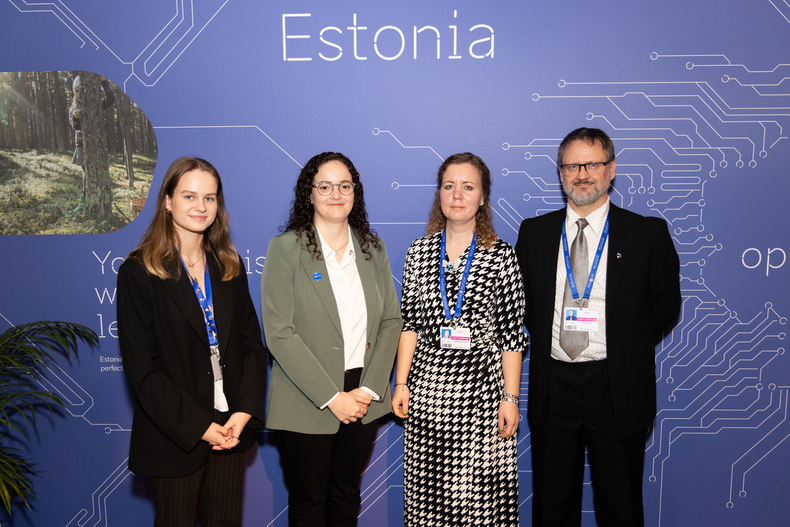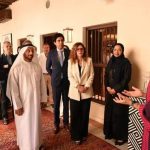H.E. Kristi Klaas, Deputy Secretary General of the Ministry of Climate, Estonia, brought a nuanced perspective to the ongoing climate discussions at COP28 during her keynote address. H.E. Klaas stressed the need to move beyond conventional discussions separately and focus on adopting measures to combat climate change. Instead, she urged delegates to consider the broader implications of climate change on vital sectors such as education, healthcare, and soil management.
H.E. Klaas highlighted the often-overlooked role of healthy soils in preserving ecosystems, providing not only nourishing food but also playing a necessary role in climate change. Expressing satisfaction with the increased attention given to this crucial issue at COP28, she emphasized the necessity for accurate data to comprehend soil status across diverse lands and land uses.
Recent discussions at the Food, Agriculture, and Water Day, held at the Estonia pavilion, featured a session titled “Contextualized Carbon Sequestration in Agriculture Soils: Potential and Limits” where panellists Leva Licite, Research assistant, Latvian State Forest Research Institute, and Elsa Putku, soil science expert, centre of Estonia Rural Research and Knowledge delved into the complex relationship between soils and carbon sequestration. Their insights emphasized the importance of locally tailored approaches to achieve carbon-neutral and climate-resilient agriculture.
Key points from the session included the nuanced impact of sustainable agricultural practices on carbon sequestration, the variable response of soils under different conditions, and the crucial role of effective soil management to enhance soil quality across diverse environments.
A session titled “Food and Wood: Towards Zero-Waste” explored sustainable solutions for food and wood production side streams. Expert panellists Timo Kikas, Professor of biosystems engineering, Estonian University of Life Sciences, Reelika Ratsep, Researcher of sustainable food production, Estonian University of Life Sciences, and Lisandra Rocha Meneses, Senior Researcher of biorefinery, Estonian University of Life Sciences engaged in a comprehensive discussion on the urgent need to address challenges related to food waste.
In Estonia, where the roots of food waste are deeply embedded in the hospitality and household sectors, the panellists provided a stark reality check, unravelling the potential of reimagining industrial food waste as an essential food ingredient and functional component. They challenged the conventional narrative that dismisses a significant portion of food waste as irredeemable, emphasizing the transformative power of innovative approaches that can turn industrial food waste into valuable resources.
Moreover, the panellists drew a global spotlight on the alarming statistic that approximately one-third of the food produced worldwide meets a frustrating fate in landfills, creating an environmental catastrophe. The session didn’t just stop at pointing out the problem but fervently called for an urgent awakening among consumers, retailers, and manufacturers to not just reduce food production but to wage a full-scale combat against waste.
In a comparative analysis, the panellists mentioned that Estonia, has a population of 1.3 million, against the UAE, a giant with 9.6 million inhabitants. The waste production per capita revealed a stark contrast: Estonia, produced 395 kilograms of waste, and the UAE, a staggering 640 kilograms per capita. Where this brings a global food waste crisis and highlights the need for international collaboration to tackle this issue.
The following session titled “Climate Resilient Agriculture – Is the Future of Food Organic?”, where panelists Ants-Hannes Viira, Head of Agricultural Research, The Centre of Estonian Rural Research and Knowledge and Marko Kass, Director of Research, The Centre of Estonian Rural Research and Knowledge explored the challenges of ensuring sustainable food security. The discussion shed light on Estonia’s exemplary 23% of organically managed agricultural land, ranking the country fourth globally in this regard. The panellists attributed Estonia’s success in organic farming to its natural balance and underscored the importance of nutrients derived from grass for cattle production.
At the Estonia pavilion during COP28, delegates engaged in more discussions about Cultivating Soil Health, Transforming Agriculture with Genetic Engineering, and Circular Innovations for Sustainable Food & Fertilizers Production. These conversations contribute to a sustainable and resilient future.





